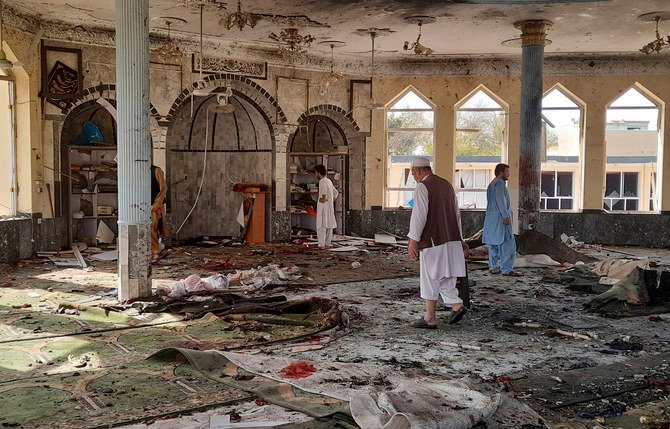
- ARAB NEWS
- 06 Jul 2025

The bold and public claims by Daesh-Khorasan that it was responsible for the recent terror attacks against minorities in Afghanistan raise serious questions about the Taliban’s ability to combat the terrorist group and the need for a global effort to counter its threat.
During Friday prayers last week, two suicide bombers attacked the Bibi Fatima mosque in Kandahar city, southwestern Afghanistan. They shot and killed the mosque’s guards before entering the building and blowing themselves up, killing more than 40 people and injuring dozens more. A statement attributed to Daesh-Khorasan confirmed its claim of responsibility for the attack.
The previous Friday, another suicide attack targeted a Shiite mosque during Friday prayers in the northern city of Kunduz, killing at least 50 people and injuring many more. Daesh-Khorasan also claimed responsibility for this cruel attack.
The group was believed to have been nearly eradicated in 2019, especially in eastern Afghanistan, by US, NATO and government forces. However, it has been able to regroup since then. With US and NATO troops no longer in the country, Daesh-Khorasan’s activity is likely to increase further, menacing Afghans and their neighbors. It is believed to currently have about 2,000 fighters, including foreigners, but this number is likely to increase if nothing is done to curb the group’s growth.
It is clear that Daesh-Khorasan is taking advantage of the political instability in Afghanistan and using the opportunity to bolster its public support and recruitment efforts. Its recent attacks have increased its visibility. In a twisted way, its growing notoriety may bolster its efforts to enlist new recruits, as well as defectors from other groups, from Afghanistan and other countries.
In the past, it has targeted Afghan politicians, ministries and government security forces, the Taliban, and US and NATO forces. It has also attacked the civilian staff of international organizations, including aid workers, minority groups and ordinary Afghans. There has been a marked increase in Daesh-Khorasan’s violence since the US and NATO forces withdrew from Afghanistan in August.
The recent mosque attacks are challenging the Taliban’s grip on the country and their repeated statements denying terrorist groups a haven in Afghanistan.
Daesh-Khorasan’s attacks on fellow Muslims, including Shiite and Sufi Afghans, are among its most brutal acts and are used by the group to demonstrate its commitment to upholding false interpretations of Islam. In May 2020, a hospital’s maternity ward in Kabul and a funeral in Kuz Kunar, in the north of the country, were attacked, resulting in the deaths of 56 people and injuries to 148 others, including newborns, mothers, nurses and mourners. Daesh-Khorasan claimed responsibility for the funeral attack and the US blamed it for both.
A year later, a car bomb and two additional explosive devices targeted a school in a predominantly Shiite neighborhood of western Kabul, killing more than 90 people and injuring hundreds. Most of the victims were teenage girls. In the same month, a bomb exploded inside a Kabul mosque as worshippers gathered for Eid Al-Fitr, killing at least 12 people and injuring another 15. Daesh-Khorasan claimed responsibility for the attack.
With US and NATO troops no longer in Afghanistan, Daesh-Khorasan’s activity is likely to increase further.
Dr. Abdel Aziz Aluwaisheg
In August, the group claimed responsibility for a bomb attack on a bus carrying Shiite Afghans in the western city of Herat. There have been similar, albeit less frequent, attacks against Sufi Afghans.
Attacking Shiite and Sufi schools and places of worship has become a hallmark of Daesh and its regional affiliates. Daesh and its Khorasan chapter frequently use social media to incite violence against Muslim minorities and justify their murderous attacks by calling these minorities apostates or non-believers.
One of the most gruesome attacks in Egypt’s history was instigated in November 2017 by the Daesh affiliate in the Sinai Peninsula against a mosque frequented by local Sufis. According to official sources at the time, 311 worshippers were killed, including 27 children, and about 130 more were injured. Up to 40 armed men from Daesh’s Sinai branch carried out the assault on Al-Rawda mosque in Bir Al-Abed. Egyptian prosecutors said that the carefully planned attack was carried out by the Daesh men, who arrived in five SUVs and were armed with automatic machine guns. They followed a military-style, methodical plan to mow down worshippers.
Similar attacks, though with fewer casualties, have been carried out against Shiites, Sufis and other Muslims by Daesh and its affiliates or sympathizers, which claim the mantle of Islam in many conflict-ridden countries. That violence is the extreme application of hate speech against Muslim minorities.
Social media, in particular, is full of such speech, some of which excommunicates these minorities and places them beyond the pale of Islam. While peaceful religious debates about such subjects have been around for centuries, turning them into manifestos to attack minorities should not be tolerated.
In November 2017, during the first meeting of defense ministers for the Islamic Military Alliance to Combat Terrorism, Crown Prince Mohammed bin Salman rightly said that the greatest danger posed by terrorists comes from them distorting Islam’s reputation and the portrayal of its values. It therefore becomes especially important for Muslims to stand up for vulnerable minorities. Mainstream Islamic organizations, including the Muslim World League, the Organization for Islamic Cooperation and Al-Azhar, as well as prominent influencers of all types, should join together to combat the type of hate speech perpetuated by Daesh, Daesh-Khorasan and other terror groups to justify their murderous attacks on peaceful minorities.